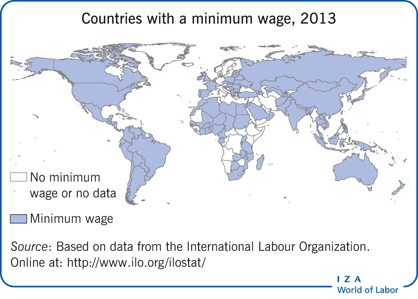Elevator pitch
An increase in the minimum wage in immigrant destination countries raises the earnings that low-skilled migrants could expect to attain if they were to migrate. While some studies for the US indicate that a higher minimum wage induces immigration, contrasting evidence shows that immigrants are less likely to move into areas with higher or more frequent increases in the minimum wage. These different findings seem to reflect different relocation decisions by immigrants who have lived in the US for several years, who are more likely to move in response to higher minimum wages, and by new immigrants, who are less likely to move.

Key findings
Pros
Theory predicts that an increase in the minimum wage raises the wage that immigrants expect to attain in the destination country.
There is evidence that minimum wage policies do not negatively affect the employment of recently arrived immigrants.
Empirical findings suggest that immigrants react to the minimum wage by relocating within the country, thereby relaxing downward pressure on the employment of native-born workers.
Some empirical evidence implies that the minimum wage does not affect the inflow of undocumented immigrants.
Cons
Other empirical evidence suggests that a minimum wage increases the supply of low-skilled immigrants, possibly tightening job competition for low-skilled natives and earlier immigrants.
An increase in the minimum wage induces migrants who have been in the country longer to relocate, potentially disrupting their assimilation.
A dearth of empirical evidence makes it difficult to predict the response of immigration to changes in the minimum wage, especially outside the US.
Findings of an immigration response to changes in the minimum wage are sensitive to the methodology applied.